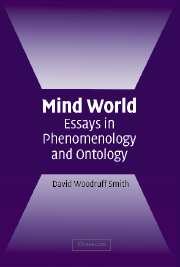Book contents
- Frontmatter
- Contents
- Prolegomena: The Terroir of Consciousness and the World
- Origins of the Essays
- Overview: A Story Line
- The Picture
- 1 Three Facets of Consciousness
- 2 The Cogito circa a.d. 2000
- 3 Return to Consciousness
- 4 Consciousness in Action
- 5 Background Ideas
- 6 Intentionality Naturalized?
- 7 Consciousness and Actuality
- 8 Basic Categories
- Coda: The Beetle in the Box
- Appendix: Background Conceptions of Ontology, Phenomenology, Philosophy of Mind, and Historical Philosophy
- Index
- References
Overview: A Story Line
Published online by Cambridge University Press: 05 June 2012
- Frontmatter
- Contents
- Prolegomena: The Terroir of Consciousness and the World
- Origins of the Essays
- Overview: A Story Line
- The Picture
- 1 Three Facets of Consciousness
- 2 The Cogito circa a.d. 2000
- 3 Return to Consciousness
- 4 Consciousness in Action
- 5 Background Ideas
- 6 Intentionality Naturalized?
- 7 Consciousness and Actuality
- 8 Basic Categories
- Coda: The Beetle in the Box
- Appendix: Background Conceptions of Ontology, Phenomenology, Philosophy of Mind, and Historical Philosophy
- Index
- References
Summary
The Background
In a moment I will sketch a line of argument, or rather narrative, that weaves through the essays gathered here. But first let me recall some background notions broadly assumed in that story line.
Consciousness is a consciousness “of” something, and this of-ness – called intentionality – is the tie that binds consciousness and world together.
Intentionality is itself the structure in which we know about the world. This structure begins with mental and practical acts on the one hand and objects of various types on the other. Phenomenology works from intentionality into structures of experience, or conscious mental activity, whereas ontology works inter alia from intentionality into structures of the world in general (including mental activity). We do not normally think of ontology as beginning with intentionality. As Quine has stressed, however, our ontology consists of what we posit in our preferred theories – what we posit, I note, in our intentional activities of theorizing.
So we may think of working from intentionality into phenomenology on the one hand and into ontology on the other hand. In one direction lies “subjective” structure; in the other lies “objective” structure. Both directions are pursued in the essays gathered in this book, but the subjective and objective, I urge, are part of one world with a unified structure. (By contrast, Descartes posited two realms of mind and body, and Kant separated two spheres called phenomena and noumena, or things-as-they-appear and things-as-they-are-in-themselves.)
- Type
- Chapter
- Information
- Mind WorldEssays in Phenomenology and Ontology, pp. 1 - 7Publisher: Cambridge University PressPrint publication year: 2004



